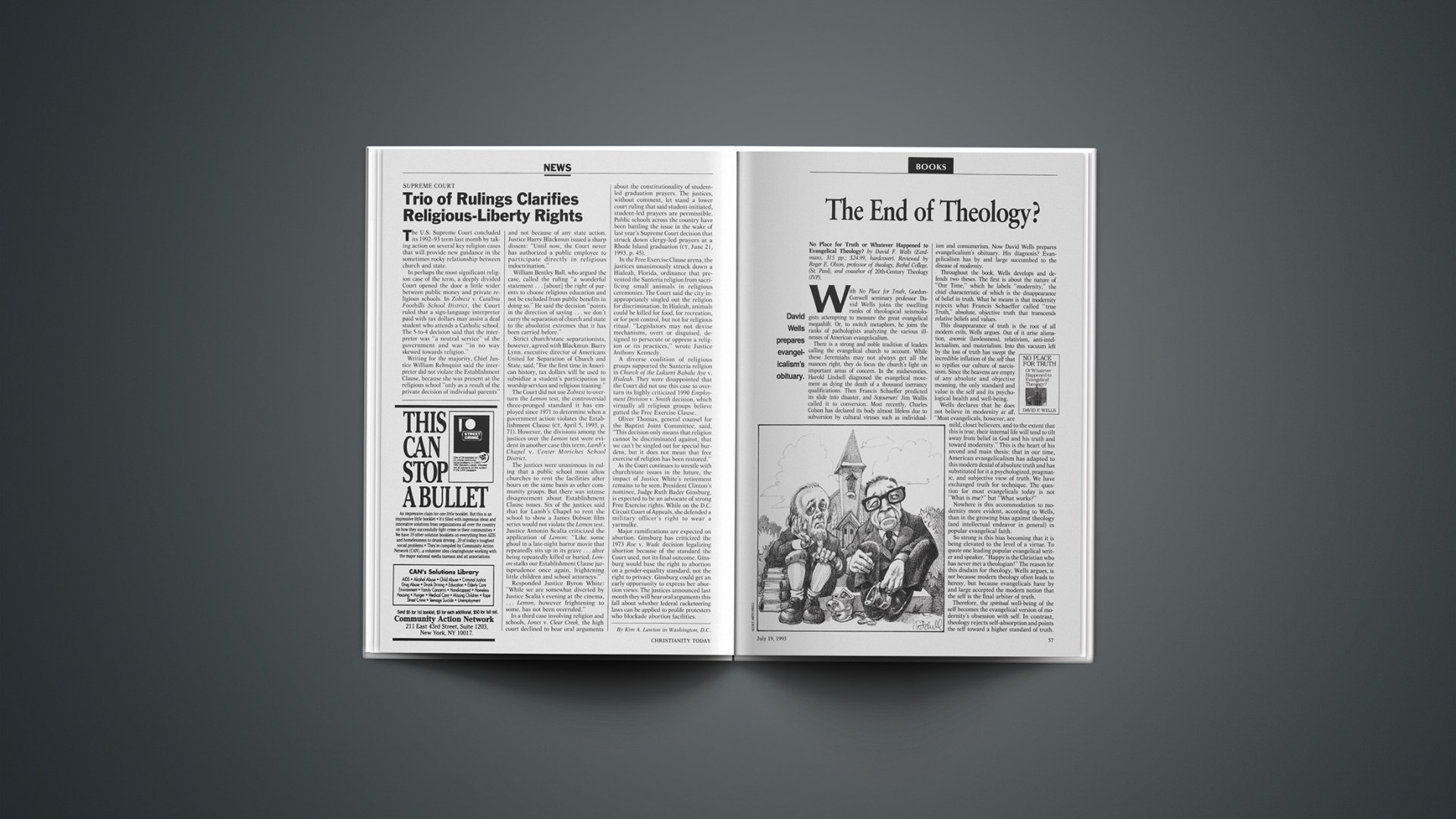The U.S. Supreme Court concluded its 1992–93 term last month by taking action on several key religion cases that will provide new guidance in the sometimes rocky relationship between church and state.
In perhaps the most significant religion case of the term, a deeply divided Court opened the door a little wider between public money and private religious schools. In Zobrest v. Catalina Foothills School District, the Court ruled that a sign-language interpreter paid with tax dollars may assist a deaf student who attends a Catholic school. The 5-to-4 decision said that the interpreter was “a neutral service” of the government and was “in no way skewed towards religion.”
Writing for the majority, Chief Justice William Rehnquist said the interpreter did not violate the Establishment Clause, because she was present at the religious school “only as a result of the private decision of individual parents” and not because of any state action. Justice Harry Blackmun issued a sharp dissent: “Until now, the Court never has authorized a public employee to participate directly in religious indoctrination.”
William Bentley Ball, who argued the case, called the ruling “a wonderful statement … [about] the right of parents to choose religious education and not be excluded from public benefits in doing so.” He said the decision “points in the direction of saying … we don’t carry the separation of church and state to the absolutist extremes that it has been carried before.”
Strict church/state separationists, however, agreed with Blackmun. Barry Lynn, executive director of Americans United for Separation of Church and State, said, “For the first time in American history, tax dollars will be used to subsidize a student’s participation in worship services and religious training.”
The Court did not use Zobrest to overturn the Lemon test, the controversial three-pronged standard it has employed since 1971 to determine when a government action violates the Establishment Clause (CT, April 5, 1993, p. 71). However, the divisions among the justices over the Lemon test were evident in another case this term, Lamb’s Chapel v. Center Moriches School District.
The justices were unanimous in ruling that a public school must allow churches to rent the facilities after hours on the same basis as other community groups. But there was intense disagreement about Establishment Clause issues. Six of the justices said that for Lamb’s Chapel to rent the school to show a James Dobson film series would not violate the Lemon test. Justice Antonin Scalia criticized the application of Lemon: “Like some ghoul in a late-night horror movie that repeatedly sits up in its grave … after being repeatedly killed or buried, Lemon stalks our Establishment Clause jurisprudence once again, frightening little children and school attorneys.”
Responded Justice Byron White: “While we are somewhat diverted by Justice Scalia’s evening at the cinema, … Lemon, however frightening to some, has not been overruled.”
In a third case involving religion and schools, Jones v. Clear Creek, the high court declined to hear oral arguments about the constitutionality of student-led graduation prayers. The justices, without comment, let stand a lower court ruling that said student-initiated, student-led prayers are permissible. Public schools across the country have been battling the issue in the wake of last year’s Supreme Court decision that struck down clergy-led prayers at a Rhode Island graduation (CT, June 21, 1993, p. 45).
In the Free Exercise Clause arena, the justices unanimously struck down a Hialeah, Florida, ordinance that prevented the Santeria religion from sacrificing small animals in religious ceremonies. The Court said the city inappropriately singled out the religion for discrimination. In Hialeah, animals could be killed for food, for recreation, or for pest control, but not for religious ritual. “Legislators may not devise mechanisms, overt or disguised, designed to persecute or oppress a religion or its practices,” wrote Justice Anthony Kennedy.
A diverse coalition of religious groups supported the Santeria religion in Church of the Lukumi Babalu Aye v. Hialeah. They were disappointed that the Court did not use this case to overturn its highly criticized 1990 Employment Division v. Smith decision, which virtually all religious groups believe gutted the Free Exercise Clause.
Oliver Thomas, general counsel for the Baptist Joint Committee, said, “This decision only means that religion cannot be discriminated against, that we can’t be singled out for special burdens, but it does not mean that free exercise of religion has been restored.”
As the Court continues to wrestle with church/state issues in the future, the impact of Justice White’s retirement remains to be seen. President Clinton’s nominee, Judge Ruth Bader Ginsburg, is expected to be an advocate of strong Free Exercise rights. While on the D.C. Circuit Court of Appeals, she defended a military officer’s right to wear a yarmulke.
Major ramifications are expected on abortion. Ginsburg has criticized the 1973 Roe v. Wade decision legalizing abortion because of the standard the Court used, not its final outcome. Ginsburg would base the right to abortion on a gender-equality standard, not the right to privacy. Ginsburg could get an early opportunity to express her abortion views. The justices announced last month they will hear oral arguments this fall about whether federal racketeering laws can be applied to prolife protesters who blockade abortion facilities.
By Kim A. Lawton in Washington, D.C.










